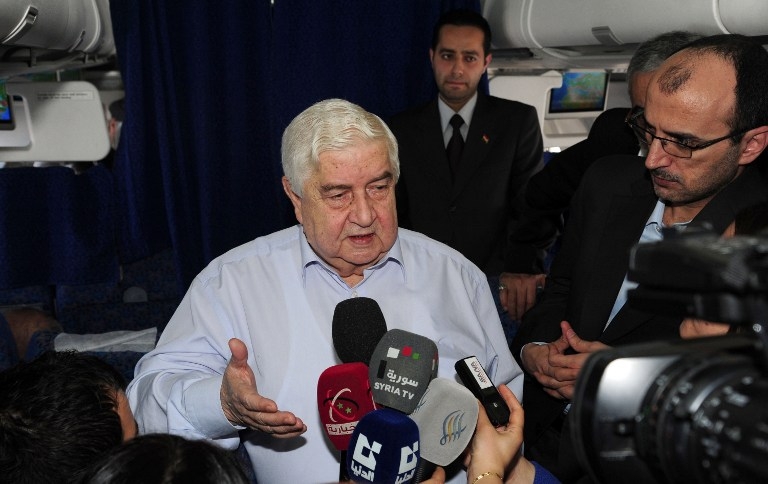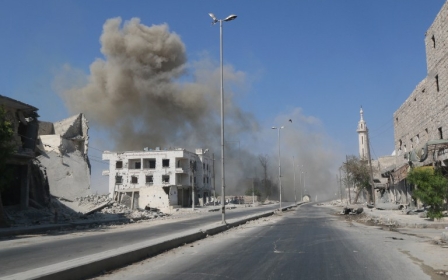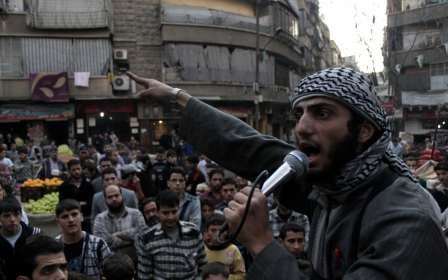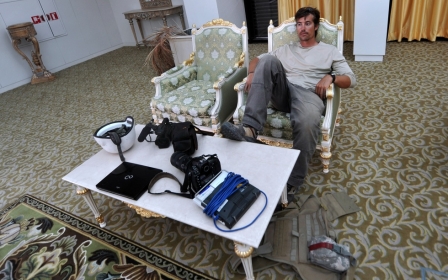Syria says ready to work with world against 'terror'

Syria said Monday it was willing to work with the international community, including the United States, to tackle "terrorism" but that any strikes on its territory must be coordinated with Damascus.
Foreign Minister Walid Muallem made the comments as the Islamic State (IS) militant group advances in Syria and neighbouring Iraq, where Washington is already carrying out air strikes.
The group, which has declared an Islamic "caliphate" in the territory it holds in Syria and Iraq, has raised international concern and prompted rare unanimous approval of a UN Security Council resolution to tackle militants.
"Syria is ready for cooperation and coordination at the regional and international level to fight terrorism and implement UN Security Council Resolution 2170," Muallem said.
Muallem said Syria was willing to work within international or regional coalitions as well as on bilateral terms.
He said Damascus was also prepared to work with the United States and Britain, both of which back Syrian rebels in their fight to overthrow President Bashar al-Assad.
"They are welcome," he said.
But he said any military action inside Syrian territory must be carried out in coordination with the government and respect the country's sovereignty.
"We must feel that the cooperation is serious and not double standards," he said.
"Any violation of Syria's sovereignty would be an act of aggression," he said.
Asked if Syria's air defences could shoot down US planes, he said: "That could happen if there was not prior coordination.
"We are proposing international cooperation and coordination to prevent" such a scenario.
There would be "no justification" for strikes on Syrian territory "except in coordination with us to fight terrorism."
Tackle 'terror sources'
The United State began carrying out air strikes in Iraq on 8 August, in bid to halt advances close to the Kurdish regional capital Erbil.
But US chairman of the Joint Chiefs of Staff General Martin Dempsey acknowledged last week that IS could not be defeated in Iraq alone.
"Can they be defeated without addressing that part of the organisation that resides in Syria? The answer is no," he said.
Muallem said even air strikes would be insufficient to wipe out the IS, which emerged from al-Qaeda's former Iraqi affiliate but has since broken ranks with that group.
"We welcome every effort to fight al-Nusra Front and the Islamic State, but the real question is: are air strikes enough to wipe them out? I don't think so," he said.
Any strikes would have to be accompanied by "the drying up for the sources of terrorism, particularly financing and arming, along with proper control of the border and intelligence sharing," he added.
The IS has advanced in Syria, taking territory from both armed opposition groups in northern Aleppo province and from the Syrian army in Raqqa province, also in the north.
On Sunday, the group's fighters seized the Tabqa air base, the last post controlled by the Syrian army in Raqqa.
The capture of the base puts the group in control of an entire province for the first time, including the provincial capital which has become a stronghold for the militants.
Around 170 Syrian soldiers were killed in the fighting for the base on Sunday. The IS reportedly beheaded a number of them and displayed the corpses in the Raqqa provincial capital.
IS extreme violence
IS has developed a reputation for extreme human rights violations and acts described as war crimes, including decapitations, crucifixions and stoning people to death.
Last week, the group distributed a video showing one of its fighters beheading US journalist James Foley, who had been held hostage in Syria.
Muallem condemned Foley's murder, but also criticised the West for what he said was its "silence when Syrian soldiers and civilians were being killed by this group."
In response to IS advances, the Security Council passed its resolution on 15 August intended to stem funding and the flow of foreign fighters to IS and al-Nusra Front.
Muallem welcomed the resolution on Monday, though he said it was "late" in coming.
Syria's government has long termed its battle against an uprising that began in March 2011 a "war on terror."
It considers all those seeking Assad's ouster to be "terrorists".
New MEE newsletter: Jerusalem Dispatch
Sign up to get the latest insights and analysis on Israel-Palestine, alongside Turkey Unpacked and other MEE newsletters
Middle East Eye delivers independent and unrivalled coverage and analysis of the Middle East, North Africa and beyond. To learn more about republishing this content and the associated fees, please fill out this form. More about MEE can be found here.




